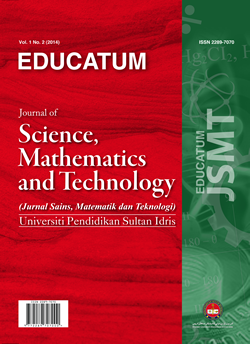The Reliability and Usability Perception of Organic Chemistry Synthetic Pathways Board Game
DOI:
https://doi.org/10.37134/ejsmt.vol8.1.3.2021Keywords:
organic chemistry, synthetic pathways, board game, game-based learning, perceptionsAbstract
This study aims to present the reliability and student’s usability perception of an educational board game in teaching and learning synthetic pathways at matriculation level. This board game mainly called as Synthetic Pathways of Organic Compounds (COPS). The research design used was ADDIE model. Needs analysis survey on 35 chemistry teachers and lecturers as well as previous literatures proved synthetic pathways and retrosynthetic reactions can be taught using game-based learning approach. Respondents for the research were one year matriculation program students from one of the colleges in Malaysia which was determined using two stage cluster sampling. Analysis of the usability perception data (mean score) shows students agreed on achieving learning goals (4.57) of organic chemistry synthetic pathways via COPS board game. Besides that, they also agreed on attractive board design (4.45), good board organisation (4.43), excellent playability (4.48) and high usability (4.48). Besides that, COPS board game also has showed high reliability with the coefficient value recorded at 0.984. The output of this study implies that COPS board game has high reliability and usability perception in learning organic chemistry synthetic pathways among matriculation students.
Downloads
References
Malaysia, K.P. (2013). Pelan Pembangunan Pendidikan Malaysia 2013-2025. Putrajaya: Kementerian Pendidikan Malaysia.
Chen K.S. (2013, December 8). Poor show in PISA rankings. TheStar, p.1. Retrieved from https://www.thestar.com.my/News/Education/2013/12/08/Poor-show-in-Pisa-rankings/
Mullis, I. V., & Martin, M. O. (2017). TIMSS 2019 Assessment Frameworks. International Association for the Evaluation of Educational Achievement. Herengracht 487, Amsterdam, 1017 BT, The Netherlands.
Talib, O., Nawawi, M., Ali, W. Z. W., & Mahmud, R. (2012). Simple Explicit Animation (SEA) approach in teaching organic chemistry. Procedia - Social and Behavioral Sciences, 69(Iceepsy), 227–232. https://doi.org/10.1016/j.sbspro.2012.11.403
Carney, J. M. (2015). Retrosynthetic rummy: A synthetic organic chemistry card game. Journal of Chemical Education, 92(2), 328–331. https://doi.org/10.1021/ed500657u
Teixeira, J., & Holman, R. W. (2008). A simple assignment that enhances students’ ability to solve organic chemistry synthesis problems and understand mechanisms. Journal of Chemical Education, 85(1), 88–89. https://doi.org/10.1021/ed085p88
Triboni, E., & Weber, G. (2018). MOL: Developing a European-style board game to teach organic chemistry. Journal of Chemical Education, 95(5), 791–803. https://doi.org/10.1021/acs.jchemed.7b00408
Farmer, S. C., & Schuman, M. K. (2016). A simple card game to teach synthesis in organic chemistry courses. Journal of Chemical Education, 93(4), 695–698. https://doi.org/10.1021/acs.jchemed.5b00646
Othman, A., & Talib, O. (2015). Tahap kefahaman asas kimia organik dalam kalangan pelajar Kolej Matrikulasi aliran Teknikal. Jurnal Pendidikan Sains & Matematik Malaysia, 5(2), 86–97.
Jadual Penentu Ujian Kimia SK025 (2017), Sektor Penilaian & Peperiksaan, Bahagian Matrikulasi, Kementerian Pendidikan Malaysia.
Schaller, C. P., Graham, K. J., & Nicholas Jones, T. (2014). Synthesis road map problems in organic chemistry. Journal of Chemical Education, 91(12), 2142–2145. https://doi.org/10.1021/ed400886k
Emre, R.K., Daat, H.B., Austin, A.C., Gould, I.R., (2016). A web-based teaching tool for multi-step synthesis in organic chemistry: Student perpsectives and motivations, EDULEARN16 Proceedings, pp. 6559-6565
Pursell, D. P. (2009). Adapting to student learning styles: Engaging students with cell phone technology in organic chemistry instruction. Journal of Chemical Education, 86(10), 1219–1222. https://doi.org/10.1021/ed086p1219
Alexander, S. V. (2008). Chemistry for Kids Elements — A card game of chemical names and symbols, 85(4).
Wang, B. S., & Hsu, H. (2009). Using the ADDIE Model to design second life activities for online learners, 53(6): 76-81.
Saper, N., Ain, N., Daud, M., & Ahmad, N. (2016). Kesahan dan Kebolehpercayaan Modul I-Sc (Islamic Spiritual Counseling) ke atas Pelajar Bermasalah Tingkah Laku Validity and Reliability of Islamic Spiritual Counselling Module on Troublesome Students. International Journal of Islamic Thought, 9, 32–43. https://doi.org/10.24035/ijit.9.2016.004
Alfaifi, K. M. (2013). Using board games to teach physics.
Esdras, D., Uchoa, D. A., Anne, M., Lima, S., Nunes, J., & Monteiro, A. J. (2019). Stereochemistry game: Creating and playing a fun board game to engage students in reviewing stereochemistry concepts. https://doi.org/10.1021/acs.jchemed.8b00897
Selvi, M., & Çoşan, A. Ö. (2018). The effect of using educational games in teaching kingdoms of living things. Universal Journal of Educational Research, 6(9), 2019–2028. https://doi.org/10.13189/ujer.2018.060921
Wardani, S., Lindawati, L., & Kusuma, S. B. W. (2017). The development of inquiry by using android-system-based chemistry board game to improve learning outcome and critical thinking ability. Jurnal Pendidikan IPA Indonesia, 6(2), 196–205. https://doi.org/10.15294/jpii.v6i2.8360
Heale, R., & Twycross, A. (2015). Validity and reliability in quantitative studies. Evidence-Based Nursing, 18(3), 66–67. https://doi.org/10.1136/eb-2015-102129





